Steve Nash, Ray Allen, Grant Hill, Jason Kidd and Maurice Cheeks all have one thing in common - they were inducted to the Hall of Fame today. Cheeks was one of those inductees who didn't have much fanfare around him during his career, but his legacy has stood the test of time well enough for the Hall of Fame committee to recognize his impact on the game with the greatest basketball accolade there is.
With the Hall of Fame class of 2018 well and truly enshrined for times immemorial at the Naismith Memorial Basketball Hall of Fame venue at Springfield today, we decided to take a look at what caliber of player defines the boundary for induction.
Accordingly, the following 10 players are examples of players who aren't yet in the Hall of Fame, but have factions of basketball fans who would argue to death for why they belong in the famed chamber:
#1 Ben Wallace
To most people who watched the NBA in the early-00s, one of the biggest head-scratching decisions made by the Naismith Memorial Basketball Hall of Fame committee is their failure to approve of the induction of a certain 6'9" center who won Defensive Player of the Year honours 4 times during a time when defensive powerhouses like Kevin Garnett, Tim Duncan and Jermaine O'Neal were anchoring elite defenses of their own.
Explore the NBA Draft 2024 with our free NBA Mock Draft Simulator & be the GM of your favorite NBA team.
Wallace is the greatest undrafted player to play in the league in the last 20 years or so. An undersized center with little to no offensive skill, Wallace entered the league and carved a space for himself like few others at his combination of size and position have done.
He is the only player to record 7 straight seasons averaging at least 1.3 steals and 2.0 blocks per game, and he was the fulcrum of a defensive lineup that is regarded as one of, if not the best in NBA history. His impact allowed teams to experiment with smaller centers in the future, and paved the way for the likes of Draymond Green to thrive in the league based off their defense.
The fact that he was a severely limited offensive player is the major argument against his induction, but the committee has already set a precedent of sorts by honouring Dennis Rodman with an induction, and given Wallace's overall career accolades, he surely deserves recognition in the same manner.
#2 Chris Webber
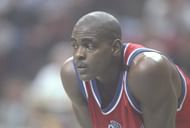
Pretty much like Big Ben, C-Webb was an early 2000s monster who's often glossed over when people talk about the greatest basketball players of this century, or indeed, all time. In a career which saw him turn around the fortunes of whichever franchise he moved to, Webber has consistently been pushed under the rug in the conversation of players who should be first-ballot Hall of Famers.
Webber averaged 20 points for 9 straight seasons from his sophomore year. During this period, he averaged over 9 rebounds in 8 of those seasons, and over 10 rebounds in 6. He missed out on All-NBA honours and All-Star status on at least a couple of occasions due to injuries - meaning that concessions have to be made for his extended dominance as a dominant scoring big who could also pass, defend on switches and also act as a rim protector at the same time.
Never forget that Webber's teams consistently ranked among the best in the league, even though playoff success isn't high on his resume. A lot of players with worse playoff resumes are in the Hall already, however, and that should not be much of a problem when the HoF committee eventually does induct him.
#3 Sidney Moncrief
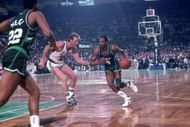
Moncrief is the 80s version of Ben Wallace in terms of having an extremely high defensive peak. What makes his non-induction even more puzzling is that his defensive peak also coincided with a sizeable offensive peak, as Moncrief averaged 20 points per game over the 5 seasons that were the best of his career.
Hailed by Michael Jordan as the best defensive player His Airness had ever faced, it was The Squid who handed the GOAT his first playoff exit in his rookie season, leading the Bucks to a first round series win by 3-1 in 1985 against the Bulls.
The DPOY award was basically created just so they could give it to him, twice in a row. Such a crazy good player, and to me he really meets the criteria of an outstanding basketball player because of his incredible defense combined with 20+ppg on good efficiency.
Unfortunately for the Hall of Fame committee, his peak was deemed to be too short for valid consideration, even though players like Grant Hill have been inducted for roughly the same amount of peak value.
#4 Amar'e Stoudemire
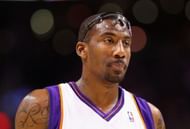
By all accounts, the first 9 seasons of Stat's NBA career proved that he was well on his way to a Hall of Fame induction. It was during his second season in New York with the Knicks that the injury bugs began to affect both his presence and his play on the court, and he never regained the elite athleticism and bulldozing power that was a nightmare for any frontcourt player in the league earlier in his career.
Drafted in 2002 with the 9th overall pick by the Phoenix Suns, Stat went on to win Rookie of the Year honours, before making 6 All Star Game appearances and garnering 5 All-NBA selections, including a First-Team selection in 2007 while beating off the likes of LeBron James, Kevin Garnett, Chris Bosh and Carmelo Anthony.
He was the perfect roll man for Steve Nash to combine with, and the duo were responsible for several deep playoff runs made by the Suns in the mid- and late-noughties. 2 years removed from his retirement now, there are questions about whether or not he will be inducted. In my opinion, even if he is not a first ballot selection, he had a career well worthy of such an honour.
#5 Rasheed Wallace
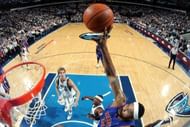
All of his rather less-approvable records for technical fouls and ejections aside, Rasheed Wallace was one of the most talented and underrated frontcourt players of his generation. Constantly overlooked from All-NBA and All-Star teams because of all-time great players playing in the forward spots during his career, Sheed's relatively low number of accolades compared to the average Hall of Famer should not detract from the impact he had on the league and fans worldwide - a major factor of consideration for the induction process.
A great player comparison that can be made for Sheed with a player who played a similar style with greater success is Chris Bosh. Wallace could shoot right in the face of defenders after drawing them way outside the paint, and yet had the skill to bang down low.
As a defender, he was one of the major reasons why the Pistons were able to stifle everything the league threw at them during those years when they made 6 straight Conference Finals.
If ball really don't lie, Sheed belongs in the Hall.
#6 Chauncey Billups
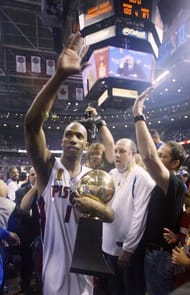
One of the greatest clutch players of all time, Billups consistently gets overlooked in the conversation about the best point guards of the 2000s because he was a pass-first guy who played in an era stacked with all-time great point guards. His tally of 18 gamewinners is better than the likes of famed clutch players like LeBron James, for example.
Mr. Big Shot was no slouch on the other side of the ball either, contributing his bit to the greatest defensive lineup of this century by expending extraordinary effort at locking down opposition point guards. His early career struggles notwithstanding, Billups is the personification of a championship-caliber point guard from the time before analytics influenced the strategies of NBA teams.
#7 Tim Hardaway
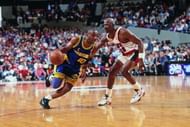
One of the players primarily responsible for the propagation of ballhandling shenanigans like the crossover dribble move, Hardaway's impact on youngsters learning to ball today is up there with the likes of Iverson, among others. His double-crossover move, popularly known as the UTEP 2-step (University of Texas El Paso was his alma mater), was a vicious maneuver that routinely left the best defenders of his time with their ankles in serious danger of sprains.
Hardaway's career was capped off by injury troubles like many others on this list, although he was still an effective player after 1996 and made 2 All-Star teams. His Heat teams were regularly up there with the Pacers and the Knicks as second fiddle to the Bulls at the top of the Conference, and I get the feeling that the Hall of Fame committee has underrated many players from that generation.
#8 Shawn Marion
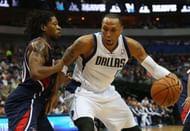
The Matrix is one of the greatest two-way small forwards of all time, but isn't held in the same regard as several players he played along with. After all, in an era when the likes of LeBron James, Carmelo Anthony and Paul Pierce took the headlines for their teams with winning plays on the ball, understated off-ball studs like Marion who were at least as talented and versatile as the aforementioned players tend to get overlooked.
Marion's 4 All-Star game selections would have comfortably been higher had he been playing in this era. He was a better defender overall than the likes of Jimmy Butler and Paul George today, and at his peak, he was an efficient scorer who had the athleticism and speed to get by his primary defender right to the hole.
There is still a chance that Marion gets his bow at Springfield in the years to come: Basketball Reference's algorithm gives him a 75% chance of induction in the Hall.
#9 LaMarcus Aldridge
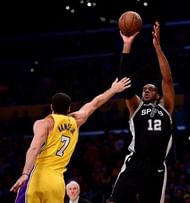
The only currently active player on this list, there has to come a time when Aldridge receives his due from people other than his teammates and his peers. The #2 overall pick from the 2006 NBA draft has cemented his name among the foremost frontcourt players of his generation with his performances with the Spurs last season, as he effectively led them to 47 wins on his own with an injury-hobbled roster.
Aldridge has become an amazing two-way player who can win you a game on both ends of the court, and his 6 All-Star Game selections in addition to 5 All-NBA Team selections are testament to this.
#10 Peja Stojakovic
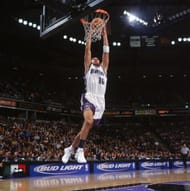
Predrag, or Peja Stojakovic as he's known in NBA circles, is one of the greatest players in Sacramento Kings history. His #16 jersey hangs in the rafters of the Golden Center as testament to the amazing things he achieved with one of the most talented teams never to win a championship.
Having started his career off with Croatian basketball club KK Crvena Zvezda at the tender, young age of 15, he moved to Greek club PAOK a year later. 3 years of stellar play as a youngster brought him to the notice of the NBA, and he was selected by the Kings with the 14th overall pick in the all-time great 1996 NBA Draft before being stashed with PAOK for 2 more years.
Finally brought to American shores in 1998, he came off the bench for 2 seasons before achieving a breakthrough 2000-01 season after being moved to the starting small forward spot. He finished 4th in MVP voting in the 2003-04 season following a season averaging 24.2 points per game on 48% shooting from the field, 43.3% from the 3-point line and a league-leading 92.7% from the charity stripe.
During this time, he was also responsible for historic international success for the Yugoslav basketball team, which won gold at the 2001 FIBA Eurobasket and the 2002 FIBA World Cup.
The peak years of Peja's NBA career are Hall of Fame caliber, but what puts him over the top is this success he had on the international stage in a sport dominated by the USA.
Sacramento Kings Nation! You can check out the latest Sacramento Kings Schedule and dive into the Kings Depth Chart for NBA Season 2024-25.
